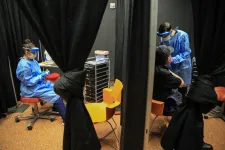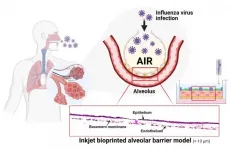(Press-News.org) PITTSBURGH, March 26, 2021 - As evidence mounts supporting the use of monoclonal antibody treatment to reduce hospitalizations and deaths from COVID-19, UPMC and University of Pittsburgh School of Medicine physician-scientists are sharing the health system's experience administering the life-saving medication.
In a report published today in the scientific journal Open Forum Infectious Diseases, the UPMC/Pitt team shares how it quickly established the largest and most equitable distribution network for COVID-19 monoclonal antibody infusions across Pennsylvania. The team today also reported preliminary results confirming the treatment reduced likelihood of hospitalization and death in UPMC patients who received it.
"When administered soon after infection, this treatment can help certain people fight the virus and keep them from progressing to serious illness and death," said Ryan Bariola, M.D., associate professor in Pitt's Division of Infectious Diseases and director of the UPMC Community Hospital Antimicrobial Stewardship Efforts (CHASE) Program. "But administering these infusions comes with logistical challenges, so many health care providers opt not to offer the treatment. UPMC overcame these challenges, and we're dedicated to sharing what we learned with other medical centers, clinicians and the public."
Monoclonal--"mono" means "one" and "clonal" means "copy"--antibodies are a type of medication that seeks the COVID-19 virus in a person's body and blocks it from infecting their cells and replicating. Since late 2020, the U.S. Food & Drug Administration has granted Emergency Use Authorization (EUA) to three monoclonal antibody treatments--one from Regeneron and two from Eli Lilly--which are given through a one-time IV infusion. This is the same type of emergency authorization given to the COVID-19 vaccines being administered in the U.S.
This therapy is most helpful when given early, especially within 10 days of infection in people at highest risk of complications from COVID-19.
The U.S. supply of monoclonal antibodies is taxpayer-funded and given without charge to the institutions that administer it. Preparing for high patient demand, UPMC created a weighted lottery to ensure fair allocation of its supply. However, demand was never high enough to trigger use of the lottery.
"This lower use surprised us, and we're still debating why demand was less than expected," said co-author Donald M. Yealy, M.D., UPMC chief medical officer and professor and chair of Pitt's Department of Emergency Medicine. "It likely had to do with so few health care providers investing in the infrastructure, staff and processes needed to administer the drug. This created lower awareness among both patients and clinicians about the life-saving benefits of monoclonal antibodies."
Initially, eligibility was limited to patients 65 years or older, or to those with a body mass index of at least 35 because those were the people studies had indicated were most likely to benefit. UPMC has since expanded eligibility to younger people with certain medical conditions that place them at higher risk for complications from COVID-19, including children, in compliance with the EUA.
To date, UPMC has treated more than 1,000 patients with monoclonal antibodies at 16 sites across the communities it serves in Pennsylvania and New York. It also provides home infusion services when needed. UPMC ensures that all proper infection prevention protocols are followed, and specifically prevents COVID-19 patients from mixing with other patients at the infusion centers.
"Monoclonal antibodies are a crucial part of the COVID-19 treatment spectrum, bridging the gap between preventive measures--such as masks, social distancing and vaccination--and the various therapies for hospitalized COVID-19 patients," said senior author Mark Schmidhofer, M.D., professor of medicine at Pitt and medical director of UPMC's Coronary Intensive Care Unit. "It's a potentially life-saving option and can keep people out of the hospital if prevention fails."
INFORMATION:
Patients and providers can find out more about monoclonal antibody treatment at UPMC by visiting upmc.com/AntibodyTreatment or calling 866-804-5251.
Additional authors of this research are Erin McCreary, Pharm.D., Tina Khadem, Pharm.D., Graham Snyder, M.D., M.S., Richard Wadas, M.D., David A. Nace, M.D., M.P.H., and Douglas B. White, M.D., M.A.S., all of Pitt and UPMC.
To read this release online or share it, visit https://www.upmc.com/media/news/032621-bariola-mab-ofid.
Additional Contact: Danielle Sampsell
Office: 814-889-2622
Mobile: 412-420-9818
E-mail: SampsellD@upmc.edu
About UPMC
A $23 billion health care provider and insurer, Pittsburgh-based UPMC is inventing new models of patient-centered, cost-effective, accountable care. The largest nongovernmental employer in Pennsylvania, UPMC integrates 92,000 employees, 40 hospitals, 700 doctors' offices and outpatient sites, and a 4 million-member Insurance Services Division, the largest medical insurer in western Pennsylvania. In the most recent fiscal year, UPMC contributed $1.4 billion in benefits to its communities, including more care to the region's most vulnerable citizens than any other health care institution, and paid more than $800 million in federal, state, and local taxes. Working in close collaboration with the University of Pittsburgh Schools of the Health Sciences, UPMC shares its clinical, managerial, and technological skills worldwide through its innovation and commercialization arm, UPMC Enterprises, and through UPMC International. U.S. News & World Report consistently ranks UPMC Presbyterian Shadyside among the nation's best hospitals in many specialties and ranks UPMC Children's Hospital of Pittsburgh on its Honor Roll of America's Best Children's Hospitals. For more information, go to UPMC.com.??? ??????
About the University of Pittsburgh School of Medicine
As one of the nation's leading academic centers for biomedical research, the University of Pittsburgh School of Medicine integrates advanced technology with basic science across a broad range of disciplines in a continuous quest to harness the power of new knowledge and improve the human condition. Driven mainly by the School of Medicine and its affiliates, Pitt has ranked among the top 10 recipients of funding from the National Institutes of Health since 1998. In rankings recently released by the National Science Foundation, Pitt ranked fifth among all American universities in total federal science and engineering research and development support.
Likewise, the School of Medicine is equally committed to advancing the quality and strength of its medical and graduate education programs, for which it is recognized as an innovative leader, and to training highly skilled, compassionate clinicians and creative scientists well-equipped to engage in world-class research. The School of Medicine is the academic partner of UPMC, which has collaborated with the University to raise the standard of medical excellence in Pittsburgh and to position health care as a driving force behind the region's economy. For more information about the School of Medicine, see http://www.medschool.pitt.edu.
http://www.upmc.com/media
EL PASO, Texas - Sreenath Chalil Madathil, Ph.D., assistant professor in industrial manufacturing and systems engineering (IMSE) at The University of Texas at El Paso, is working to streamline the process and ease the patient experience at COVID-19 vaccination clinics in the United States to ensure faster vaccine distribution.
Madathil led a team of UTEP faculty, staff and students who observed several of El Paso's drive-though and walk-in clinics in early 2021. The team identified areas that likely created bottlenecks, which produce delays and other issues. They used the information ...
A University of Florida study of middle-aged and older adults finds those who unknowingly carry methicillin-resistant Staphylococcus aureus, or MRSA, on their skin are twice as likely to die within the next decade as people who do not have the bacteria.
"Very few people who carry MRSA know they have it, yet we have found a distinct link between people with undetected MRSA and premature death," said the study's lead author Arch G. Mainous III, Ph.D., a professor in the department of health services research, management and policy at the UF College of Public Health and Health Professions, part of UF Health, the university's academic health center.
The findings suggest that routine screening for undetected ...
The warmer temperature and blooming flowers signal the arrival of spring. However, worries about respiratory diseases are also on the rise due to fine dust and viruses. The lung, which is vital to breathing, is rather challenging to create artificially for experimental use due to its complex structure and thinness. Recently, a POSTECH research team has succeeded in producing an artificial lung model using 3D printing.
Professor Sungjune Jung of the Department of Materials Science and Engineering, and Professor Joo-Yeon Yoo and Ph.D. candidate Dayoon Kang of the Department of Life Sciences at POSTECH have together succeeded in creating ...
Key takeaways
Surgery is an underused treatment for certain pancreatic cancer patients.
Patients with pancreatic cancer who underwent surgery after chemotherapy lived nearly twice as long as those treated with only chemotherapy.
Findings confirms current recommendations for stage II pancreatic cancer: survival improves when patients receive multimodality therapy, chemotherapy before and/or after surgery.
All analyses of the data delivered the same findings.
CHICAGO (March 26, 2021, 9:00 am CDT): Patients with stage II pancreatic cancer who are treated with chemotherapy followed by resection (an operation that removes the cancerous part of the organ, structure or tissue) live nearly twice as long as patients who receive only chemotherapy, according ...
In recent years, with the rapid development of flexible electronic skins, high-performance flexible tactile sensors have received more attention and have been used in many fields such as artificial intelligence, health monitoring, human-computer interaction, and wearable devices. Among various sensors, flexible capacitive tactile sensors have the advantages of high sensitivity, low energy consumption, fast response, and simple structure. Sensitivity is an important parameter of the sensor. A common way to improve sensitivity is to introduce microstructures and use ionic dielectric materials at the interface ...
A new catalyst for the conversion of carbon dioxide (CO2) into chemicals or fuels has been developed by researchers at Ruhr-Universität Bochum and the University of Duisburg-Essen. They optimized already available copper catalysts to improve their selectivity and long-term stability. The results are described by the team led by Dr. Yanfang Song and Professor Wolfgang Schuhmann of the Bochum Center for Electrochemistry with the team led by Professor Corina Andronescu of the Duisburg-Essen Technical Chemistry III group in the journal Angewandte Chemie, published online on 9 February 2021.
Boron makes copper catalyst stable
The ...
Current approaches to a common and debilitating knee injury that occurs more frequently for women than men have focused for too long on biology at the expense of understanding social factors, say the authors of a new paper in the British Journal of Sports Medicine (BJSM).
Girls and women are said to be between three to six times more likely to suffer an anterior cruciate ligament (ACL) injury, where one of the key ligaments that helps to stabilise the knee joint is damaged. The devastating injury, which in extreme cases can be career ending for professional sportspeople, commonly occurs during sports that involve sudden changes in direction (e.g. basketball, football ...
When the brain suffers injury or infection, glial cells surrounding the affected site act to preserve the brain's sensitive nerve cells and prevent excessive damage. A team of researchers from Charité - Universitätsmedizin Berlin have been able to demonstrate the important role played by the reorganization of the structural and membrane elements of glial cells. The researchers' findings, which have been published in Nature Communications*, shed light on a new neuroprotective mechanism which the brain could use to actively control damage following neurological injury or disease.
The nervous system lacks the ability to regenerate nerve cells and is therefore particularly vulnerable to injury. Following brain injury or infection, various cells ...
An elusive whale species in the Southern Ocean could be resilient to near-future ecosystem changes, according to a new study by the universities of Exeter and Copenhagen.
Gray's beaked whales living in the deep oceans of the Southern Hemisphere are rarely seen alive and their ecology has remained a mystery to scientists until now.
The study used genome sequencing of 22 whales washed up on beaches in South Africa, Australia and New Zealand to investigate the history of the population over the past 1.1 million years.
Author of the study Dr Kirsten Thompson, of the University of Exeter, said: "The population approximately doubled about 250 thousand years ago, coinciding with a period of increased Southern Ocean productivity, sea surface temperature and a potential ...
Nanowires are vital components for future nanoelectronics, sensors, and nanomedicine. To achieve the required complexity, it is necessary to control the position and growth of the metal chains on an atomic level. In the journal Angewandte Chemie, a research team has introduced a novel approach that generates precisely controlled, helical, palladium-DNA systems that mimic the organization of natural base pairs in a double-stranded DNA molecule.
A team from Europe and the USA led by Miguel A. Galindo has now developed an elegant method for producing individual, continuous chains of palladium ions. The process is based on self-organized assembly of a special palladium complex ...




